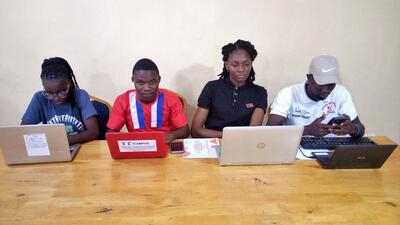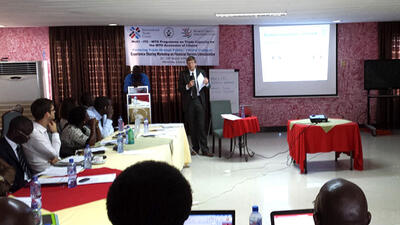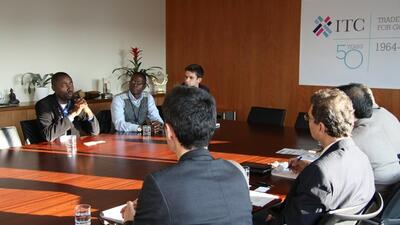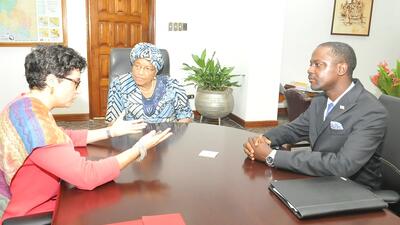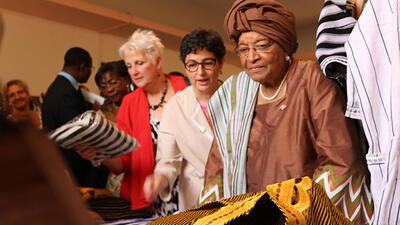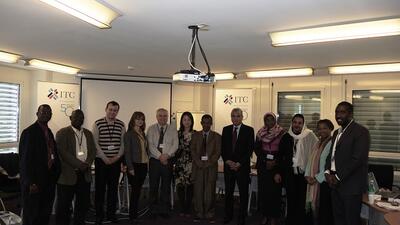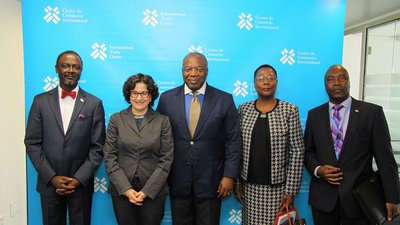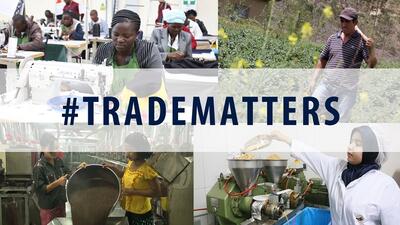La cooperación entre el sector privado y el gobierno es esencial para maximizar los beneficios de la adhesión de Liberia a la OMC (en)
That was the message at a meeting earlier this month where representatives from private sector associations and government ministries and agencies met to discuss Liberia’s bid for WTO membership. At the three day event, attended by over 50 participants, it was agreed to step up cooperation between the government and the private sector through new partnerships, in a vast range of policy areas and sectors on which accession to the WTO will have an impact.
The event was organized by ITC in close cooperation with Liberia’s Ministry of Commerce and the Liberia Chamber of Commerce (LCC). ITC offered its support to facilitate the work ahead, as part of the ITC-WTO programme for WTO Acceding Least Developed Countries (LDCs).
Liberia applied for WTO membership in 2007. Over the coming months, the Liberian Government intends to formulate its initial offers for goods and services, as a basis for further negotiating with WTO members and carrying out coupled reforms to bring Liberia’s trading environment in line with WTO agreements.
Minister Axel Addy, responsible for leading the Liberian Ministry of Commerce coordinated technical committee on WTO accession, said: “WTO accession concerns all of us. Liberia is the last country in West Africa to become a member of WTO. At this moment, it is important to capture inputs from different government entities as well as private sector partners, to be reflected into our negotiation strategy. Most importantly, we need to build the commitment for the intensive process of carrying out and implementing regulatory reforms on a variety of issues.”
Representing the LCC members and other business associations, Mr Monie Captan, President of the LCC, said: “WTO accession should not be looked at as an end in itself. Rather, the private sector expressed its wish that the process would be utilized as a means to an end, to achieve broader goals, addressing the shared interests, for example with regard to an improved business environment. Businesses feel that WTO accession is an opportunity for Liberia to further improve its policies, regulations and implementation, for the benefit of its people, its enterprises and towards developing exports.”
It was pointed out that a lot of issues under review by WTO members had already been on the table as part of ECOWAS or domestic reform discussions. Mr Captan said: “Now is the time to frame the issues within a WTO context, with WTO principles and regulations in mind, and assess where the priorities for Liberia’s businesses and government should be.” He also said: “New partnerships between government agencies and business associations are needed to prepare and nurture the existing coordination mechanisms, such as the Liberia Better Business Forum (LBBF).”
It was acknowledged that Liberia’s accession to WTO poses certain challenges. Most urgently, understanding the potential business implications of Liberia’s WTO accession requires further strengthening amongst some government agencies as well as private sector associations. ITC expressed its willingness to provide technical assistance in this area, as well as encouraging dialogues on general and specific issues related to WTO. Ensuring appropriate regulations in compliance with WTO, as well as their implementation, was seen as a challenging task ahead for the government.
Ms Famke Schaap, ITC Business and Trade Policy Adviser, said: “Improving the understanding of all parties of the business implications of WTO membership, its opportunities and challenges, is crucial to ensure commitment within the government, as well as to ensure a fruitful collaboration between the government and the private sector. With a general dialogue mechanism being already in place in Liberia, the LBBF, there may be added value in new partnerships to discuss specific policy issues, and challenges that are sector-specific. This can ensure that the genuine interests and concerns of the private sector are fed into the negotiating positions, and build the consensus needed to successfully conclude the negotiations, and prepare Liberia’s businesses and consumers for the new situation.”




